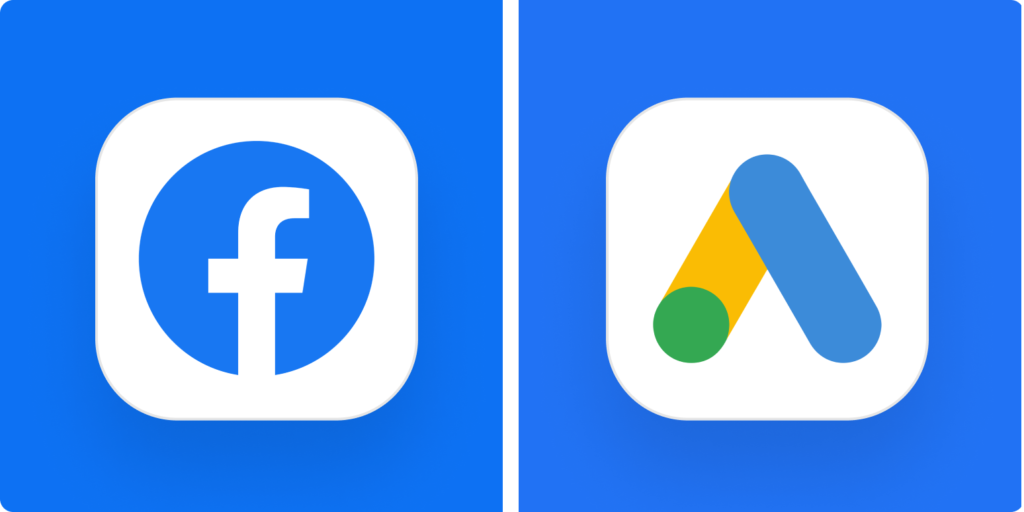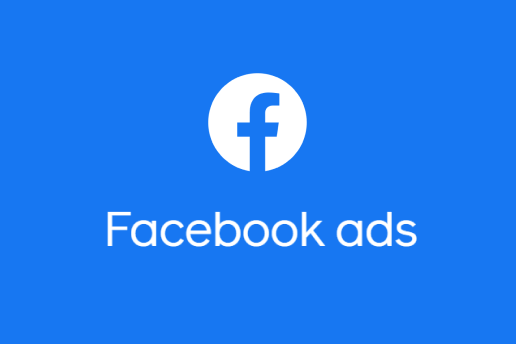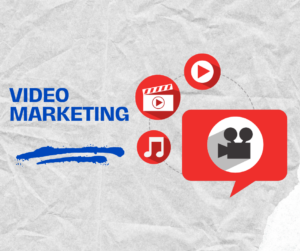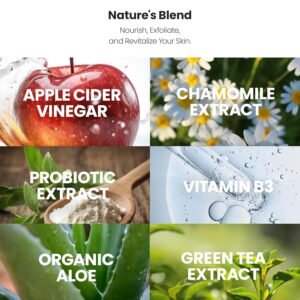
Introduction
Definition of Online Marketing
Online marketing advertising, otherwise called computerized showcasing, alludes to every one of the endeavors put into advancing and selling items or services over the web. It envelops many methodologies and stages, each customized to arrive at expected clients in various ways. The two goliaths in this field are Facebook Ads and Google Ads, each with special assets and benefits.

Overview of Facebook Ads
Facebook Ads are an area of strength for a phase made by Facebook. It grants associations to contact a monstrous group through significantly assigned campaigns, considering client economics, interests, and approaches to acting.

An Overview of Google Ads
Google Ads, previously known as Google AdWords, is Google’s internet publicizing stage. It empowers organizations to show advertisements on Google’s web search tool results pages, YouTube, and across its immense organization of accomplice sites.
The importance of choosing the right platform
Choosing between Facebook ads and Google ads can significantly impact the success of your online marketing efforts. Understanding the strengths and limitations of each platform is crucial for making an informed decision that aligns with your business goals.
Platform Overviews
Facebook Ads: An Overview
History and Development
Facebook Ads was officially launched on November 6, 2007. This significant event marked Facebook’s entry into the digital advertising market, providing businesses with a powerful new platform to reach their target audiences.>
User Demographics
Facebook boasts over 2.8 billion monthly active users, with a diverse demographic spread across various age groups, genders, and locations. This broad user base makes it an attractive option for businesses looking to reach a wide audience.
Google Ads: An Overview
History and Development
AdWords launched on October 23, 2000, with only 350 advertisers. Now, it has millions of advertisers and produces tens of billions of dollars for Google each year. In 2000, Google had approximately 20 million searches a day. Today, that has swelled to over 8.5 billion searches a day. It has evolved to include various advertising formats and networks, including search ads, display ads, shopping ads, and video ads, offering businesses multiple ways to reach their target audience. ©
User Demographics
Google’s reach is vast, with over 90% of internet users interacting with Google properties. This includes users of Google Search, YouTube, and Google Display Network, providing advertisers with a massive potential audience.
Technical Specifications
Facebook Ads Specifications
Ad Formats
Facebook Ads Online Marketing offers various ad formats, including image ads, video ads, carousel ads, slideshow ads, and collection ads. Each format is designed to engage users differently and can be tailored to specific campaign goals.
Targeting Options
Facebook’s Online Marketing targeting capabilities are one of its strongest features. Advertisers can target users based on demographics, interests, behaviors, and even life events. Custom audiences and lookalike audiences further enhance targeting precision.
Google Ads Specifications
Ad Formats
Google Ads provides multiple ad formats, including text ads, responsive search ads, display ads, shopping ads, and video ads. Each format serves different purposes and can be optimized for various campaign objectives.
Targeting Options
Google Ads offers robust targeting options, including keyword targeting, demographic targeting, geographic targeting, and device targeting. This allows advertisers to reach users at different stages of the buying journey with precision.
Applications
Using Facebook ads
Brand awareness campaigns
Facebook ads are highly effective for building brand awareness. Its visual ad formats and extensive targeting options help businesses reach a broad audience and create a strong brand presence.
Lead Generation
Facebook’s lead generation ads are designed to capture user information directly within the platform, simplifying the process and increasing conversion rates. These ads are ideal for collecting leads and driving sales.
Using Google Ads
Search network campaigns
Google’s search network campaigns allow advertisers to display text ads to users actively searching for related products or services. This intent-driven approach often results in higher conversion rates.
Display network campaigns
Google’s display network campaigns place visual ads on a vast network of partner websites, helping businesses reach users as they browse the web. This approach is excellent for remarketing and driving brand awareness.
Benefits
Benefits of Facebook Ads
Cost Efficiency
Facebook ads can be highly cost-effective, especially for businesses targeting specific demographics. Its detailed targeting options and diverse ad formats allow for efficient budget allocation.
Engagement Rates
Facebook’s interactive ad formats, such as video and carousel ads, often result in higher engagement rates. Users are more likely to interact with visually appealing and relevant content.
Benefits of Google Ads
Intent-Driven Traffic
Google Ads excels at capturing intent-driven traffic. Users actively searching for products or services are more likely to convert, making Google Ads a powerful tool for driving sales and leads.
ROI Potential
With its sophisticated bidding strategies and comprehensive analytics, Google Ads allows businesses to optimize their campaigns for maximum return on investment. Advertisers can track performance and adjust their strategies in real time.
Challenges and limitations
Challenges of Facebook Ads
Ad Fatigue
One of the main challenges with Facebook ads is ad fatigue. Users can become desensitized to ads over time, leading to decreased engagement and effectiveness. Regularly refreshing ad creatives is essential to maintaining performance.
Privacy Concerns
Facebook has faced scrutiny over its handling of user data, leading to increased privacy concerns. This has resulted in stricter regulations and limitations on data usage for advertising purposes.
Challenges of Google Ads
Cost per click
Google ads can be expensive, particularly in competitive industries. High cost-per-click (CPC) rates can quickly drain advertising budgets, making it essential for businesses to manage their bids and budgets carefully.
Competition
With millions of businesses using Google Ads, competition for ad placements can be fierce. This requires advertisers to constantly optimize their campaigns and stay ahead of industry trends to maintain visibility.
Comparative Analysis
Facebook Ads vs. Google Ads
Cost Comparison
When comparing costs, Facebook ads often have a lower CPC than Google ads, making them a more affordable option for businesses with limited budgets. However, the overall cost-effectiveness depends on the specific campaign goals and audience.
Reach and Impressions
Google Ads typically offer a broader reach and higher impressions due to their extensive network. However, Facebook’s detailed targeting options can result in a more precise audience reach, potentially leading to higher engagement rates.
Conversion Rates
Conversion rates can vary significantly between the two platforms. Google Ads tend to have higher conversion rates for intent-driven searches, while Facebook Ads excel at driving engagement and building brand awareness.
Case Studies
Successful Facebook Ad Campaigns
Case Study 1
A clothing brand used Facebook ads to launch a new product line, targeting users based on their interest in fashion and previous purchasing behavior. The campaign resulted in a 30% increase in sales and a significant boost in brand awareness.
Case Study 2
A local restaurant utilized Facebook’s lead generation ads to promote a new menu. By targeting users in the surrounding area, they captured over 500 leads and saw a 20% increase in reservations.
Successful Google Ads Campaigns
Case Study 1
An e-commerce store used Google Search Ads to target users searching for specific products. By optimizing their keyword strategy and ad copy, they achieved a 40% increase in online sales and a 25% improvement in ROI.
Case Study 2
A software company leveraged Google Display Ads to reach potential customers browsing industry-related websites. By creating visually appealing ads and targeting relevant audiences, they saw a 50% increase in lead generation and a 30% boost in website traffic.
Expert Insights
Marketing Experts on Facebook Ads
Quotes and opinions
“Facebook ads provide unparalleled targeting capabilities, making it possible for businesses to reach their ideal customers with precision. The platform’s diverse ad formats also allow for creative and engaging campaigns.” Jane Doe, Digital Marketing Specialist
“While Facebook ads are cost-effective, it’s crucial to continually refresh your creatives to avoid ad fatigue. This helps maintain engagement and ensures your ads remain effective.” John Smith, social media strategist
Marketing Experts on Google Ads
Quotes and opinions
“Google Ads excel at capturing intent-driven traffic. When users search for specific products or services, they’re often ready to make a purchase, leading to higher conversion rates.” Alice Johnson, PPC Expert
“The key to success with Google Ads is ongoing optimization. Regularly analyzing performance data and adjusting your strategies can significantly improve ROI.” Mark Williams, SEM Consultant
Latest Innovations
Recent Developments in Facebook Ads
New Features
Facebook continues to roll out new features to enhance its advertising platform. Recent additions include augmented reality ads, which allow users to interact with products in a virtual environment, and automated ad placements, which optimize ad delivery across Facebook’s family of apps.
Algorithm Changes
Facebook’s algorithm undergoes regular updates to improve ad relevance and the user experience. Recent changes have focused on prioritizing user privacy and reducing the spread of misinformation, which impacts how ads are targeted and displayed.
Recent Developments in Google Ads
New Features
Google Ads has introduced several new features, including responsive search ads that automatically adjust to improve performance and smart bidding strategies that use machine learning to optimize bids for better results.
Algorithm Changes
Google’s algorithms are constantly evolving to deliver more relevant ads to users. Recent updates have focused on improving ad quality scores and enhancing targeting capabilities through better use of user data and machine learning.
Future Prospects
The Future of Facebook Ads
Predicted Trends
The future of Facebook ads looks promising, with anticipated trends including increased use of artificial intelligence for ad optimization, greater integration of e-commerce features, and more emphasis on video and interactive content.
The Future of Google Ads
Predicted Trends
Google Ads is expected to continue leveraging AI and machine learning to enhance ad targeting and performance. We can also expect further developments in voice search advertising and increased integration with other Google services for a seamless user experience.
User guides and tutorials
How to Set Up Facebook Ads
Step-by-Step Guide
- Create a Facebook Business Page: Start by creating a Facebook Business Page if you don’t already have one. This page will serve as the platform for your ads.
- Access Facebook Ads Manager: Navigate to Facebook Ads Manager, the hub for creating and managing your ads.
- Set Up Your Campaign: Click on “Create” to start a new campaign. Choose your campaign objective based on your marketing goals, such as brand awareness, traffic, or conversions.
- Define Your Audience: Use Facebook’s targeting options to define your audience. You can target based on location, age, gender, interests, behaviors, and more.
- Choose Your Ad Placements: Select where you want your ads to appear, such as Facebook, Instagram, Messenger, or Audience Network. You can opt for automatic placements or manually select placements.
- Set Your Budget and Schedule: Decide on your budget and schedule for the campaign. You can choose a daily or lifetime budget and set a start and end date for your ads.
- Create your ad: Choose the ad format (image, video, carousel, etc.) and upload your media. Add compelling ad copy, a headline, and a call to action.
- Review and Publish: Double-check all the details of your campaign, ad set, and ad. Once you’re satisfied, click “Publish” to launch your ad campaign.
How to Set Up Google Ads
Step-by-Step Guide
- Create a Google Ads Account: If you don’t already have one, sign up for a Google Ads account at ads.google.com.
- Choose your campaign type: Click on “New Campaign” and select the type of campaign you want to run, such as search, display, shopping, video, or app.
- Set your campaign goal: Choose your campaign goal, which can be sales, leads, website traffic, product and brand consideration, or brand awareness and reach.
- Define your audience: Specify your target audience based on demographics, interests, and behaviors. You can also use remarketing to target users who have previously interacted with your business.
- Select Keywords: For search campaigns, choose relevant keywords that potential customers might use to find your products or services. Use Google’s Keyword Planner for ideas and data.
- Set Your Budget and Bids: Decide on your daily budget and choose a bidding strategy. Google Ads offers automated bidding options like Maximize Clicks, Target CPA, and Target ROAS.
- Create your ads: Write your ad copy, including a headline, description, and display URL. Ensure your ad is compelling and includes a strong call to action.
- Review and Launch: Review your campaign settings and ad copy. Once everything looks good, click “Save and Continue” to launch your campaign.
FAQ Section
FAQs about Facebook Ads
Q: How much does it cost to run Facebook ads?
The cost of Facebook ads varies based on several factors, including your target audience, ad placement, and competition. You can set a daily or lifetime budget to control your spending.
Q: How can I track the performance of my Facebook ads?
A: Use Facebook Ads Manager to monitor the performance of your ads. You can track metrics such as impressions, clicks, conversions, and return on ad spend (ROAS).
Q: What is a lookalike audience?
A lookalike audience is a targeting option that allows you to reach new people who are similar to your existing customers. Facebook uses data from your source audience to find users with similar characteristics.
FAQs about Google Ads
Q: What is the difference between Google search ads and Google display ads?
Google Search Ads appear on Google search results pages when users search for specific keywords, while Google Display Ads appear on a network of partner websites, reaching users as they browse the web.
Q: How do I choose the right keywords for my Google Ads campaign?
A: Use Google’s Keyword Planner to find relevant keywords for your campaign. Focus on keywords that are highly relevant to your business and have a good balance of search volume and competition.
Q: How can I improve my Google Ads Quality Score?
A: Improve your quality score by creating relevant and compelling ad copy, optimizing your landing pages, and ensuring a positive user experience. High-quality scores can lead to lower costs and better ad placements.
Conclusion
Summary of Key Points
Choosing between Facebook Ads and Google Ads depends on your business goals, target audience, and budget. Both platforms offer unique advantages and challenges, and understanding these can help you make an informed decision.
Final Recommendations
For businesses looking to build brand awareness and engage with a specific demographic, Facebook ads may be a better option. If your goal is to capture intent-driven traffic and drive immediate conversions, Google Ads could be more effective.
Call to Action
Ready to boost your online marketing efforts? Consider your business goals and start exploring the potential of Facebook and Google Ads today. Experiment with both platforms to see which one drives the best results for your business.










1 thought on “Online Marketing: Is Facebook Ads or Google Ads Better?”